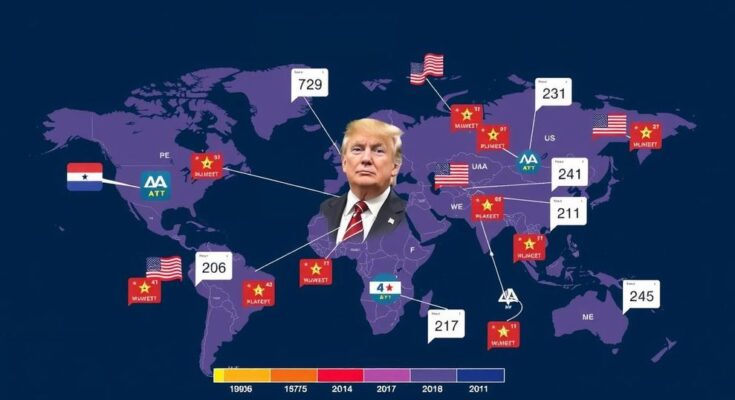Donald Trump won the U.S. presidential election, becoming the 47th president. His victory was confirmed after crucial wins, particularly in Wisconsin, and he aims to lead a “golden age” for the U.S. Global leaders quickly congratulated Trump, highlighting expectations for international cooperation and policy directions. Diverse reactions emerged from nations like Israel, Egypt, and members of the EU, while others, including Iran, addressed concerns over U.S. policy shifts. Kamala Harris has not conceded yet, with her response pending.
Donald Trump has achieved a remarkable comeback by winning the U.S. presidential election, thus becoming the 47th President of the United States, as reported by The Associated Press. His victory was sealed with an important win in Wisconsin, surpassing the crucial 270 Electoral votes. In his remarks in West Palm Beach, Florida, before the final results, Trump expressed his intent to usher in a “golden age” for the nation and heralded what he termed as “the greatest political movement of all time.” Democratic opponent Kamala Harris has not yet conceded, and is scheduled to address the nation on Thursday. Global leaders were swift to extend their congratulations. Israel’s Prime Minister Benjamin Netanyahu emphasized this win as a significant opportunity for advancing U.S.-Israel relations. Kamala Harris’s campaign faced setbacks, particularly in light of the ongoing Gaza conflict, as noted by Hamas officials who criticized the Democratic party’s policies in their statements. In contrast, leaders of several Middle Eastern nations, such as Egypt’s President Abdel Fattah el-Sisi and Qatar’s Emir Sheikh Tamim bin Hamad Al-Thani, expressed optimism regarding regional stability under a Trump presidency. Reactions also emerged from Europe, where leaders like the United Kingdom’s Prime Minister Keir Starmer and France’s President Emmanuel Macron indicated preparedness for future collaborations. Various international leaders acknowledged the significance of U.S.-European relations, with the EU emphasizing a robust partnership moving forward. Some nations such as China maintained a standard diplomatic tone despite the election’s outcomes, while Russia’s Kremlin remained cautious, noting Trump’s business acumen. As responses poured in, it became clear that Trump’s presidency would impact politics not only in America but across the globe, with allies eager to navigate a future under his leadership. In conclusion, Trump’s victory in the 2024 U.S. presidential election has elicited a mixed bag of responses from the international community. While many leaders anticipate strengthened alliances and cooperation, there are also voices of caution concerning the implications for international relations, especially in regards to conflict areas. The upcoming term appears to herald an era filled with potential shifts in diplomatic dynamics, particularly within the context of U.S. interactions with both allies and adversaries.
The recent U.S. presidential election, which concluded with Donald Trump’s win against Kamala Harris, is marked by a dramatic political landscape shaped by both domestic and international factors. The election followed a contentious campaign and was set against a backdrop of significant global concerns, particularly in regions affected by ongoing conflicts such as the Middle East. Trump’s return to the presidency is viewed through various lenses by different nations, reflecting a diverse spectrum of geopolitical interests and historical alliances. This dynamic influences how countries project their expectations and responses in light of U.S. foreign policy and international cooperation going forward.
Donald Trump’s re-election represents a pivotal moment in U.S. politics, reflecting both domestic support and global expectations from allies. His presidency is anticipated to affect relations across various regions, with leaders viewing his administration as an opportunity for renewed partnerships or raising concerns about past policies. As the international community responds, it becomes essential to monitor how these interactions evolve amid shifting political landscapes and ongoing global issues.
Original Source: www.aljazeera.com




